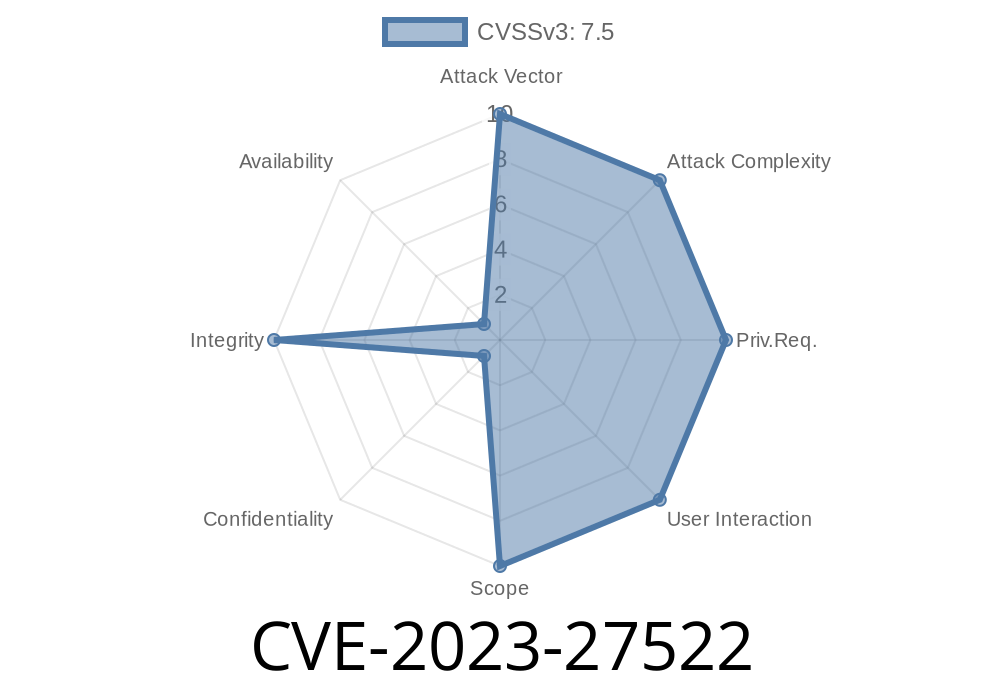The internet is built on trust. Web servers, like the famous Apache HTTP Server, are at the heart of almost every website you visit. But what happens if the server gets tricked into showing the wrong page, or leaking out sensitive information? That's where vulnerabilities like CVE-2023-27522 come in. In this post, I’ll explain what this bug is, how it works, and why it’s risky—all in plain, simple language. We'll even check out how an attacker might try to exploit it.
What Is CVE-2023-27522?
CVE-2023-27522 is a security vulnerability found in the Apache HTTP Server, specifically versions 2.4.30 through 2.4.55. The bug is in the mod_proxy_uwsgi module, which lets Apache forward requests to Python apps running under uWSGI.
The root problem is: if an upstream server (like your Python backend) sends special characters in HTTP response headers, Apache can get confused when it relays those responses to users. This can let attackers perform an HTTP Response Smuggling attack—meaning, they can "hide" malicious responses that get past security controls.
Quick Explainer: What’s HTTP Response Smuggling?
Imagine you're at a restaurant and you order soup and salad. The kitchen gives the waiter two bowls, but the waiter gets confused by a weird note on the soup bowl and brings them out as if they’re two separate orders. Another customer might end up with your soup! That's basically what HTTP Response Smuggling does: attackers mess up the “order” of responses, so one user might see another user’s data, or see stuff they shouldn’t.
Why Does This Happen in Apache?
The Apache HTTP Server works as a middleman between the client (browser) and the backend application (Python app via uWSGI). The communication uses HTTP headers, those little lines like Content-Type: text/html at the top of a response.
The problem is if the uWSGI backend, intentionally or not, puts "special characters" such as CR (Carriage Return, \\r) or LF (Line Feed, \\n) into a response header, mod_proxy_uwsgi may misinterpret the response. It might see the special character and think the header is done—or that a new response is starting. This can split/truncate the response, which opens the door for nasty tricks.
What Are The Consequences?
An attacker can craft a request to the backend (or have their own backend server). By slipping in those weird characters, they can serve a "poisoned" response that gets mixed up by Apache. Here’s what might happen:
Web cache poisoning: Malicious content is cached and served to everyone.
- Cross-site scripting or other attacks: The attacker’s script code may sneak through and run in your browser.
This is serious—especially on shared hosting or in cloud setups!
Only when you use mod_proxy_uwsgi to connect to your backend Python apps.
If you *don’t* use uWSGI or don’t run these versions, you’re safe from this specific bug.
How Does It Work? (With Code Example)
Suppose an attacker can control the backend response (maybe by hacking the app, or they control their own backend server). They could send a response header with a CRLF:
HTTP/1.1 200 OK
Content-Type: text/html
X-Evil-Header: Value\r\nHTTP/1.1 200 OK\r\nContent-Type: text/html\r\nContent-Length: 13\r\n\r\nHello, world!
Content-Length: 42
<html>Hello!</html>
\r\n is the special sequence that marks the end of a line.
- When Apache reads this, it might think a *new* HTTP response has started in the middle of the headers.
Let’s see a barebones attacker-controlled Python app
from flask import Flask, Response
app = Flask(__name__)
@app.route("/")
def index():
# Intentionally insert CRLF in the header
body = "<h1>Normal Page</h1>"
headers = {
"X-Test": "ok\r\n\r\nHTTP/1.1 200 OK\r\nContent-Type: text/html\r\nContent-Length: 10\r\n\r\nHACKEDBODY"
}
return Response(body, headers=headers)
When the Apache proxy (mod_proxy_uwsgi) is in front of this app and the attacker makes a request, the crafted response header can fool Apache into splitting the response.
Apache fixed this in version 2.4.56.
- Patch notes: ASF Security Advisory 2023-27522
- GitHub CVE record: CVE-2023-27522
Upgrade to at least Apache HTTP Server 2.4.56.
- Even after patching, make sure your backend does NOT send untrusted CR/LF characters in headers.
References
- Apache httpd Security Page
- NVD Details for CVE-2023-27522
- Common Weakness Enumeration: CWE-113 (Improper Neutralization of CRLF Sequences in Headers)
- HTTP Response Smuggling - PortSwigger
Final Thoughts
Even a small bug, like not handling special characters in headers, can cause big problems in web infrastructure. CVE-2023-27522 is a perfect example of how a single overlooked detail can weaken the whole system.
If you run Apache with mod_proxy_uwsgi, patch up ASAP and keep your eyes peeled for strange things in your logs!
Timeline
Published on: 03/07/2023 16:15:00 UTC
Last modified on: 03/14/2023 15:35:00 UTC
